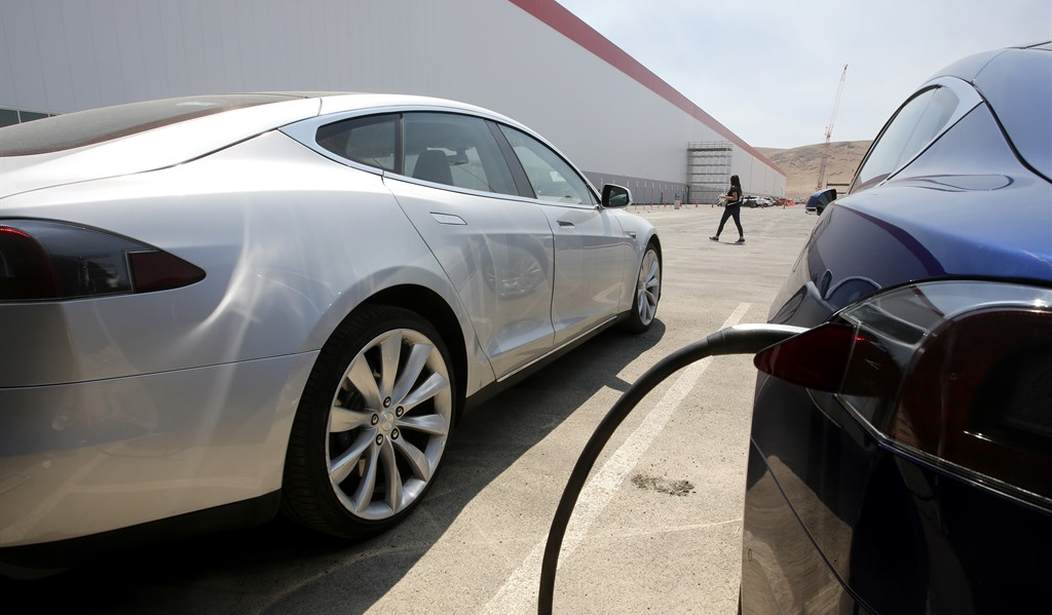Two months ago, the New York Times and CNN raised warning flags on the environmental costs of transitioning to electric cars. Last week, the Los Angeles Times followed suit, although in this case it’s the California dog that doesn’t bark that should be of greatest interest to that question. Even without the obvious questions about energy for recharging, however, the LAT raises a series of environmental issues with the necessary mining to sustain production of EVs.
The platform is as notable as the reporting in this case:
The drama playing out in the deep sea is just one act in a fast unfolding, ethically challenging and economically complex debate that stretches around the world, from the cobalt mines of Congo to the corridors of the Biden White House to fragile desert habitats throughout the West where vast deposits of lithium lay beneath the ground.
The state of California is inexorably intertwined in this drama. Not just because extraction companies are aggressively surveying the state’s landscapes for opportunities to mine and process the materials. But because California is leading the drive toward electric cars.
No state has exported more policy innovations — including on climate, equality, the economy — than California, a trend accelerating under the Biden administration. The state relishes its role as the nation’s think tank, though the course it charts for the country has, at times, veered in unanticipated directions.
Ahem. Other parts of the country have their own thoughts on “Californication,” including my newly adopted state of Texas, which are nowhere near as positive as this suggests. That is, though, one reason why it matters that the LA Times makes this deep dive into the adverse environmental and national-security impacts of EVs. They are more inclined to cheer on such “policy innovations” rather than think deeply about their implications, and this bracing look at the environmental toll of necessary mining probably comes as a surprise to a significant amount of their readership.
The “point of pride” that the LAT describes next is somewhat debatable in context:
The success of electric cars is a point of pride for not just California, but the Biden administration, which is trying to meet the commitments in the Paris climate accord. But it is also a point of panic. The administration warns the transition threatens to leave the nation vulnerable to the whims of countries that control supply chains. President Biden in June ordered the Departments of Energy and the Interior to help industry bolster mining and processing of battery materials.
China controls most of the market for the raw-material refining needed for the batteries and dominates component manufacturing; industry analysts warn the monopolization presents not only an economic risk, but also a national security one.
The cost of finding new sources for raw materials and loosening China’s grip on the supply chains is large. That much is clear in Thacker Pass, a windswept pocket of northern Nevada where the Fort McDermitt Paiute and Shoshone Tribe has for centuries hunted sage grouse, collected plants for medicine, and gathered for ceremonies. It is also the largest reserve of lithium in the United States.
Neither CNN nor the NYT mentioned Thacker Pass by name, but their coverage appears to have focused on it as well. The native tribe leadership involved claims to have been somewhat misled by mining operations hoping to extract the mineral sources in the area. In one way, tribal secretary Daranda Hinkey may have been misled by the entire enviro movement:
Hinkey, 23, studied environmental policy at Southern Oregon University, examining transportation emissions and climate change and the green economy. “But we did not talk about things like this,” she said. “We never talked about, ‘Look at how much they are extracting.’ We talked about sustainability, but this does not seem sustainable.”
Surprise! “Sustainable” is in the eye of the mining beholder, and mining “victim” if you will. It’s the NIMBY impulse all over again: cheering “sustainability” feels very good, right up to the point where it requires exploitation of land you actually value. It’s a replay of the fight over offshore windmills in Maryland, Massachusetts, and other places where otherwise-liberal communities suddenly resent the intrusion of “sustainable” infrastructure.
In this case, however, Hinkey’s more correct than she knows, and not just because of the mining operations that will be required to transition all personal vehicles to the power grid. The LAT never gets around to addressing the obvious question: how does a state that cannot sustain power to homes expect to generate the necessary extra energy needed to recharge millions of vehicles every day? California can’t even meet the demand it has now, thanks to regulations barring or severely restricting the use of fossil fuels in the state for electricity production. The state now has regular rolling blackouts to keep from crashing its grid during high-demand periods and has to buy energy from neighboring states at higher rates to keep those as limited as possible.
How sustainable is that model? Why is California pushing policies that will vastly expand electricity demand while requiring environmentally destructive operations — especially in pursuit of “environmentalism”? For understandable reasons, the LAT doesn’t even raise that issue, avoiding it just as did CNN and the New York Times, and likely for the same reason. To raise the question in this case is to answer it, and to admit that the state has Californicated itself. The Biden administration may be intent on Californicating the rest of us, but perhaps the recognition of the environmental costs of extraction (not to mention disposal, which the LAT also avoids) might end up stalling the process long enough for wiser heads to prevail.








Join the conversation as a VIP Member